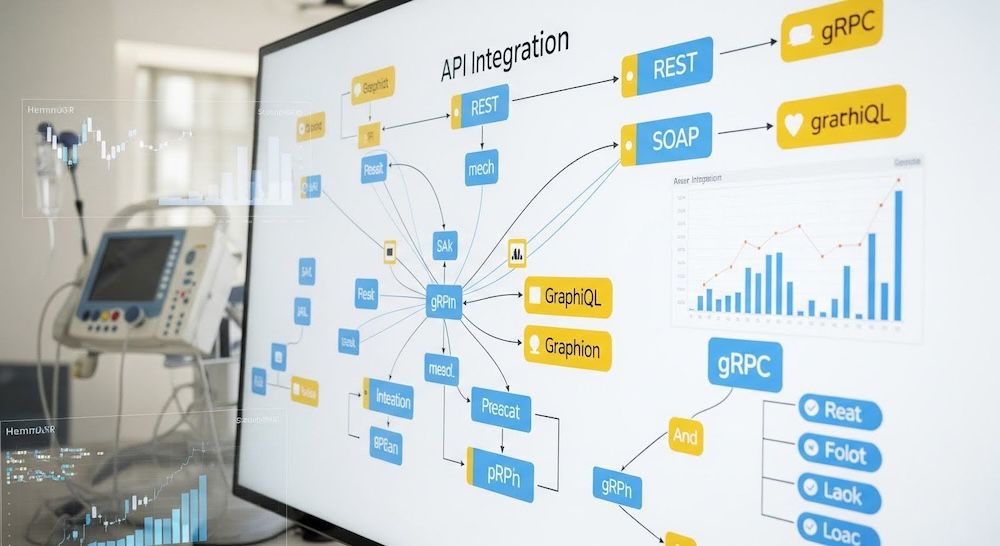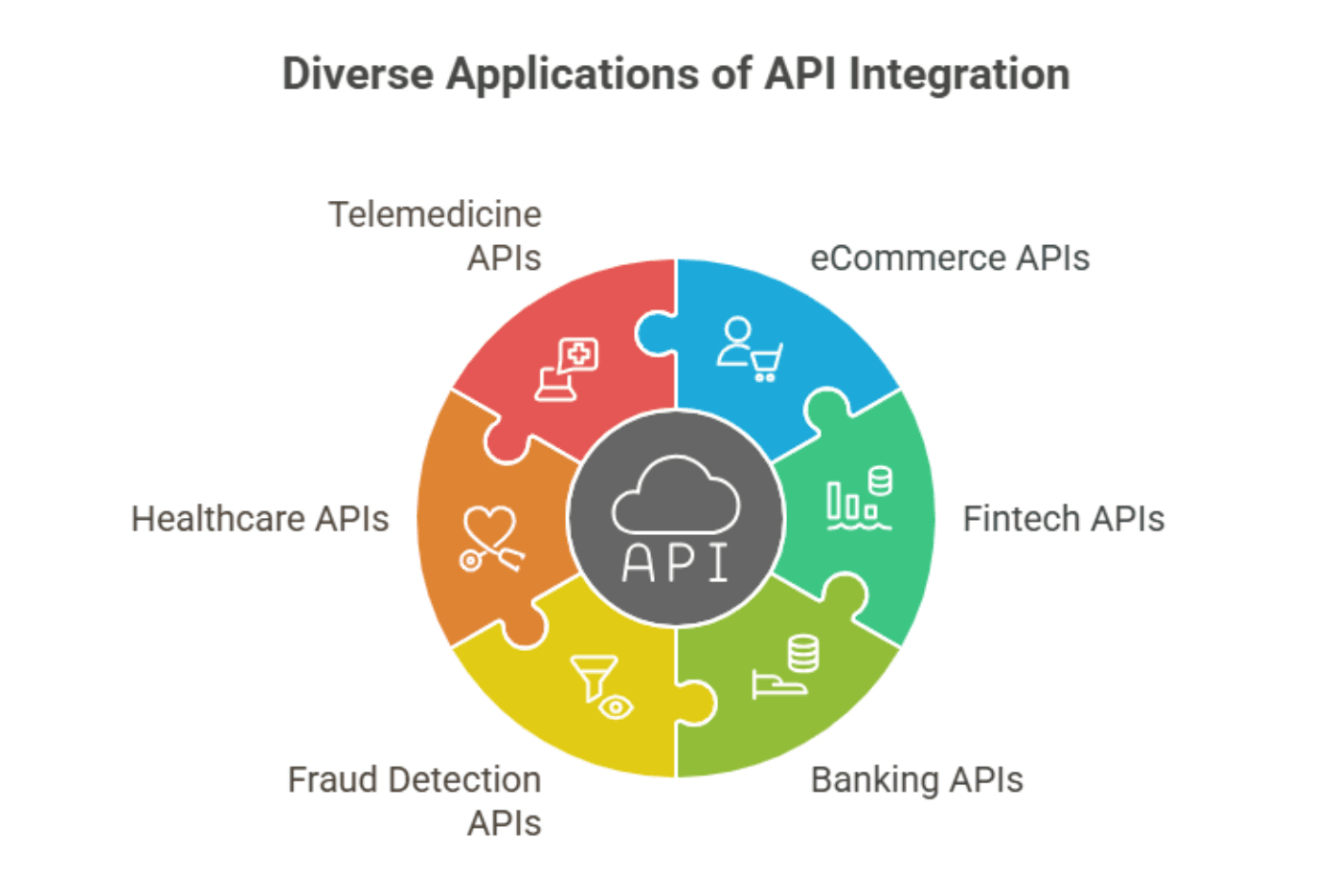Types of API Integration and Why They Matter For Industry-Specific

APIs have become indispensable in today’s data-driven business landscape. As a connective tissue that links disparate business systems and apps, they enable seamless data exchange.
Furthermore, they enable businesses to automate workflows and synchronise information in real time across CRMs and ERPs. This interoperability consequently reduces errors and streamlines operations.
Because enterprises need to dynamically respond to market demands, APIs are the engine that drives innovation, scalability, and new monetisation opportunities. APIs also empower enterprises to integrate new technologies like AI and IoT, fostering rapid experimentation.

What are APIs, and why do they matter?
An application programming interface (API) is a collection of guidelines and conventions that facilitates the sharing of information, functions, and services across disparate software.
In practice, an API is akin to a translator between two systems. The idea is that when one program sends a request, the other provides the information required, without disclosing its internal workings.
As such, APIs are the bedrock of enterprise innovation and digital transformation across different industries. They facilitate smooth data interchange and system interoperability, without pushing for the complete redesign of internal infrastructures. Thus, bridging heterogenous systems to enable new possibilities.
What is API integration?
API integration is the methodical process of interfacing two or more software systems using their APIs to programmatically enable seamless data exchange.
In practice, this real-time process orchestrates interoperability between diverse business systems, ensuring data consistency. It also supports scalability and operational efficiency in modern IT environments.
Overall, API integration is a powerful enabler that allows critical business functions—like payment processing and inventory tracking—to operate cohesively, driving operational efficiency and flexibility. This consequently supports faster time-to-market, cost savings, and augmented customer experiences, delivering new revenue streams and competitive advantages.
For more information, check out: What is API integration.
Types of API integration
Four types of API integrations are commonly employed across various industries, namely:
RESTful APIs (Representational State Transfer)
RESTful APIs are stateless, lightweight APIs typically used for web services. They are highly scalable and easy to deploy since they rely on standard HTTP techniques to facilitate client-server communication.
RESTful APIs natively exchange data in formats like JSON or XML. Overall, these characteristics make them popular in industries where rapid, scalable, and efficient data exchange is essential. For instance, Commerce and fintech,
SOAP APIs (Simple Object Access Protocol)
SOAP APIs are formal, protocol-driven APIs. In practice, they exploit XML messaging to ensure secure and reliable communication between systems.
Furthermore, they are inherently designed for sophisticated, transaction-based operations that require strict security, error handling, and compliance. As such, they are ideal for highly regulated industries like banking and healthcare, where data integrity and security are mission-critical.
GraphQL APIs
GraphQL APIs allow clients to request the exact data they need in a single request. This efficiency makes them faster, more flexible, and appreciably improves performance.
This ability to avoid over-fetching or under-fetching of data makes them well-suited for apps requiring complex queries and real-time updates. For example, eCommerce and social media apps that deliver personalised, dynamic content.
Webhooks
Webhooks are event-driven APIs that transmit real-time notifications to other systems whenever specific events occur. Thereby, enabling immediate data updates without continuous polling.
This capability makes them ideal for scenarios requiring instant responses for decision-making. For example, fraud detection in finance or telemedicine apps.
Industry-specific types of API integration

Different types of API Integration are tailored to meet the unique operational and technological needs of disparate sectors. Here are some examples:
eCommerce APIs
eCommerce APIs serve as bridges between online stores and payment gateways like Stripe and PayPal. Thereby, enabling secure and efficient payment processing directly within online stores.
Furthermore, they help synchronise sales workflows by supporting critical functions like product catalogue management, order processing, and customer management.
Their key benefit is that they facilitate seamless shopping experiences for customers while ensuring secure payments. This consequently reduces cart abandonment and improves conversion rates.
Fintech APIs
Fintech APIs facilitate real-time data sharing of transactions and account balances between financial institutions and third-party services. As such, they are mission-critical to accelerating processes such as payments, lending, and investment management.
Their primary advantages include faster transactions, fostering innovation, and streamlined financial services. These capabilities, in turn, enhance customer satisfaction and operational efficiency in the financial technology sector.
Banking APIs
Banking APIs underpin services like loan processing, account management, and compliance checks by integrating with external apps and core banking systems.
In practice, they are natively designed with a strong emphasis on security and regulatory compliance. Thereby, ensuring that sensitive financial data is safeguarded while enabling more efficient banking transactions.
Overall, banking APIs support digital transformation initiatives in the banking industry, improving operational agility.
Fraud Detection APIs
Fraud detection APIs analyse transactions in real time and flag possible fraud by connecting to risk management platforms.
In practice, these APIs help businesses lower financial risks and stop fraudulent transactions via real-time alerts of suspicious activity.
They are critical in sectors like finance and eCommerce, where security threats are uncertain, frequent, and expensive.
Healthcare APIs
Healthcare API facilitate interoperability with insurance companies, patient management programs, and electronic health records (EHRs). They enhance health provider coordination by supporting crucial features like scheduling appointments and safe patient data sharing.
Overall, they contribute to enhanced patient care and streamlined clinical workflows. Thus, facilitating better health outcomes and operational efficiency in medical institutions.
Telemedicine APIs
Telemedicine APIs interface telehealth platforms to facilitate virtual consultations, video conferencing, and remote patient monitoring.
They also help in the management of patient profiles, medical records, and appointment scheduling. Their principal advantage is their ability to improve access to healthcare services and reduce wait times. Thus, making medical care more convenient and timely for patients.
Why API integration matter for industry-specific needs?
API integration empowers disparate industries to innovate, optimise workflows, and adapt rapidly to evolving market needs by:
- Enabling seamless operations by automating workflows, appreciably reducing errors, and accelerating processes. For instance, real-time banking transactions, health records sharing, or order fulfilment in eCommerce.
- Enhancing internal processes by ensuring data consistency across critical systems like ERP, CRM, and HR. Thereby, fostering better collaboration within organisations.
- Facilitating secure and efficient data exchange with external partners, vendors, and institutions. Thus, supporting stronger business relationships and ecosystem growth.
- Enabling the creation of new service offerings tailored to industry demands. For instance, such as fraud detection in fintech, driving competitive advantage.
How to choose the right API for your business needs?
When evaluating potential APIs for your business needs, it’s imperative to consider factors that revolve around long-term success and adaptability in an evolving digital landscape. For instance:
Evaluating Business Needs
Having a strong grasp of one’s business goals and capabilities is the first step in selecting the ideal API. Define what you hope to accomplish. For instance, enhancing customer satisfaction, streamlining processes, or connecting with external services.
Afterwards, pinpoint APIs whose features complement these objectives. This step guarantees that the sought API integration will provide genuine value whilst supporting your strategic priorities.
Security and Compliance Considerations
For industries handling sensitive data, security is non-negotiable. So, investigate if prospective APIs comply with industry-specific regulations like GDPR for financial services or HIPAA for healthcare. This ensures legal and ethical handling of data.
Additionally, prioritise APIs that implement strong security protocols. For example, encryption, authentication mechanisms to safeguard your systems and customers.
Scalability and Flexibility
As your company expands, any prospective API should be able to grow with it. In fact, it should be capable of sporadically managing higher data volumes without experiencing performance dips.
Furthermore, seek out APIs that facilitate future integrations and maintain flexible architectures. This capability is key to enable you to expand or modify your technology stack without causing significant interruptions.
Why choose Techies for API integration?
Poor API integration can directly impact your business objectives—or even put you at risk of non-compliance. In fact, it can also expose your business to operational inefficiencies, security vulnerabilities, and costly disruptions.
As such, identifying the right API integration partner is indeed a strategic imperative. API integration specialists leverage their technical proficiency and problem-solving skills to achieve technological synergy and operational excellence.
Techies API integration experts focus on assisting companies in identifying and deploying APIs that meet industry-specific standards. Techies' vast experience in developing safe, scalable API solutions guarantees smooth communication between internal systems and third-party services. Additionally, the ability to provide clear documentation and post-deployment support ensures that your integration remains adaptable to future business requirements.
## Conclusion APIs are seismically transforming businesses into agile, data-driven platforms that can scale and adapt in an increasingly interconnected digital economy. As vital bridges that facilitate data sharing between diverse software systems, they are mission-critical to digital transformation and innovation.
API integration empowers organisations to streamline operations, improve internal data consistency across platforms like ERP and CRM. It also fosters secure collaborations with external partners whilst underpinning service offerings such as fraud detection.
So, in today’s fast-paced digital landscape, choosing a proven API integration agency shouldn’t be taken lightly. It’s a strategic necessity for enterprises seeking to innovate for sustainable growth and competitive advantage.
For expert API integration guidance tailored to your industry, consider reaching out to Techies to unlock the full potential of your digital transformation.
About Author
Kok Weng
Kok Weng Kong is a tech enthusiast and problem-solving expert with a passion for technology and innovation. As the Founder & CEO of Techies App Technologies Sdn. Bhd., he specializes in building beautiful web and mobile applications and providing branding and marketing solutions for businesses. With a background in Information Technology and extensive experience in the industry, Kok Weng Kong excels in creating innovative solutions for various tech challenges.

Digitizing businesses since 2017
© 2025 Techies | All rights reserved


